Sports 10
A “guajira” with good aim

A “guajira” with good aim
The 25-year-old from Santiago is the captain of the Cuban women’s archery team and is also the best archer in Cuba today
Published: Saturday 29 February 2020 | 10:18:31 pm.
 By Lianet Escobar Hernández lianet@juventudrebelde.cu
By Lianet Escobar Hernández lianet@juventudrebelde.cu
Translated and edited by Walter Lippmann for CubaNews.
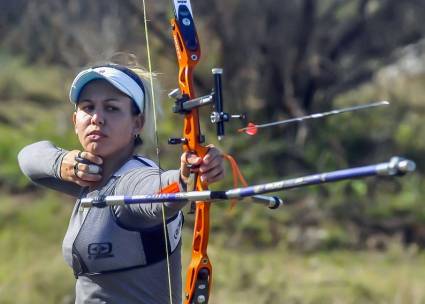
With a personal best of 635 points, the Santiago native is aiming for a ticket to the Tokyo Olympics: Author: Abel Rojas Barallobre Published: 29/02/2020 | 09:49 pm
The cry of “guajira” is heard almost constantly in the training area of the women’s national archery team. Everyone knows that when Professor Vladimir Quintas comes to the appellation, he is calling Elizabeth Rodriguez Camilo.
The 25-year-old from Santiago is the captain of the Cuban women’s archery team and does not even wrinkle her face at the adjective that replaces her name, since she knows how fond the word is when it is pronounced by the person who was her first coach when she joined the national team, approximately eight years ago.
Rodríguez Camilo is currently the best goalkeeper in Cuba. This is guaranteed by her status as national champion, a title she has won four times in a row, and also by her results in international tournaments, including two fifth places in the Pan-American Games of Lima 2019, one in the team modality and in the mixed recurve goal.
“For me, as an athlete, it is important to have won the elite tournament of my sport so many times. That’s why I prepare myself all year long, always making my best effort to win. I don’t see the domestic competition as the highest step I have to reach, I think that at the level I’m at I have to aspire to more”, commented the young woman exclusively for JR.
For Elizabeth, that step up is certainly no different than the Olympic Games. The fact that she has never been under the five hoops is a motivation for the youngster who almost achieved her dream four years ago, and now she has the chance to make it happen again.
“For the Rio 2016 Olympics I was just a few inches away from the qualifying event, because my opponent shot very well, in the end, we went to a playoff arrow and he beat me by proximity, so I have a little thorn in my side that I hope to get out of the qualifying fight that will be in the Mexican city of Monterrey, from the 22nd to the 30th of this month.
I hope and can get the Olympic place, although I assure you I would be very happy if another one of us gets it, because that will be great for the Cuban archery. However, contrary to what happens in other sports where the country wins the ticket to the competition and not the athlete, we internally decided that whoever gets the ticket is the one who will be in Tokyo. I think that’s the fairest thing and it’s an additional stimulus that we have,” argued Rodríguez Camilo.
The untamed young woman is one of the few athletes who has the opportunity to share her training and competitions with figures with vast experience in the discipline such as the woman from Matanzas, Maidenia Sarduy, whom she accompanied in what was her first foray outside the country when she was only 18 years old.
I’m lucky enough to be on the same team as Maidenia,” he said. “Her advice, like Larissa Pagan’s, was fundamental. She helped me face my first international experience at a Central American qualifying event for Veracruz 2014, held in Medellin, Colombia, where the World Archery Championship was also held.
“There I was 33rd in individual archery and fifth place in the team. That was a competition that even scared me a little bit because of the high level I had, so it was essential to have the support of those figures,” emphasized Elizabeth.
Perhaps the most difficult thing for the Cuban Artemis is to be away from home, especially from her mother Kenya, who says it is her life and like the rest of the family supports her in all her decisions, including that of leaving the sport if her personal goals are not fulfilled.
“My particular aspiration is to finish this Olympic cycle and complete another one. Although this discipline is very long-lived, where you can be in it for years, I do want to make my family and living so far away does not make things easier for me. If I could put down roots in Havana, something that would allow me to form my family and have my mother with me, then I would gladly continue with bow and arrows under my arm, otherwise, I would say goodbye to it,” she emphasized.
Racism and Xenophobia Do Not Go with Sports

Racism and Xenophobia Do Not Go with Sports
Much has been done by the international sports movement to remove discriminatory barriers based on skin color, creed, gender or political affiliation.
by Alfonso Nacianceno
February 18, 2020
Translated and edited by Walter Lippmann for CubaNews.
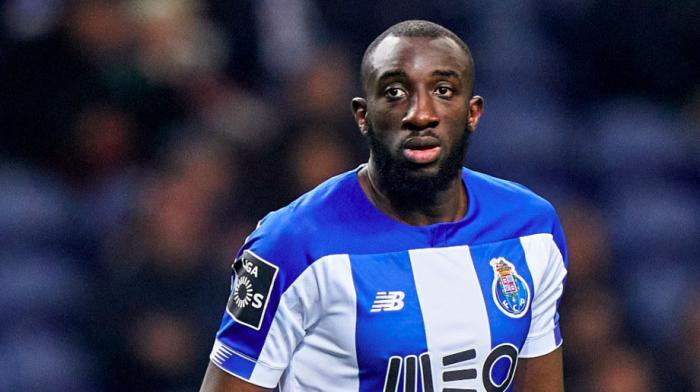
Moussa Marega was a victim of the hatred of those who do not respect the human condition. Photo: Complex
Sport knows no boundaries. Cheer up, sister, ennoble. It shapes personality, brings values, and is based on a commitment to the purpose of being better every day.
The international sports movement has worked hard to eliminate discriminatory barriers based on skin color, creed, gender or political affiliation. Thus today the wide spectrum of more than 200 countries that gather in each edition of the Olympic Games, are the highest expression of the power of sport to unite wills.
Even wars and conflicts between nations have taken truces to give way to the quadrennial appointments. This ideal of brotherhood is opposed by the xenophobia and racism that are often unleashed in football stadiums, as was the case with Mali striker Moussa Marega during the match between the Vitoria de Guimaraes and Porto in the Portuguese league last Sunday.
Having scored the goal that gave Porto a 2-1 lead, offensives, shouts and even objects thrown at the player started to come from the stands. In the midst of the hullabaloo, the player left the pitch, not without first enduring a caution from a white referee, who far from helping to calm the mood, gave Marega a yellow card.
The unbridled fanaticism of anger, guided on many occasions by the excesses of gamblers who see their money in danger from the stands, puts the lives of tens of thousands who gather in a facility to enjoy a show at risk. The hatred of those who do not respect the human condition overshadows the event.
Many are the sports in which black athletes shine and bring out the jousting. And they are not always the best paid, and the unstoppable commercialization deprives their native nations of this or that figure, who then become players in a club where they do not have to suffer the expressions of contempt like those suffered by Marega.
Jamaican sprinter Usain Bolt, multi-Olympic and world champion; Kenyan marathon runner Eliud Kipchoge, who recently dropped out of the two-hour race; American basketball player LeBron James; French judoka Teddy Riner, ten times world champion and two-time Olympic champion, to name but three stars from different specialties, attract millions of young people around the world who look to them as role models and deserve the respect they deserve. There is no reason for any human being to be subjected to vexatious treatment.
Kobe Bryant Rises to Eternity

Kobe Bryant Rises to Eternity
Kobe Bryant’s tragic death in a helicopter crash along with eight others – including Gianna, one of his four daughters – leaves immense pain, even for those who are not sports fans
——————————————————————————
Translated and edited by Walter Lippmann for CubaNews.
Author: Yosel E. Martínez Castellanos | yosel@granma.cu
January 27, 2020 23:01:53
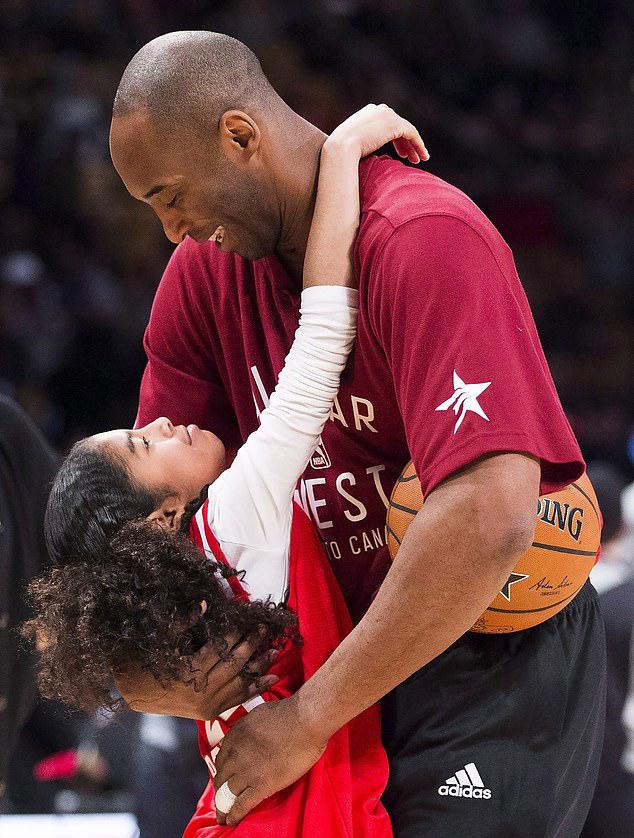
Kobe Bryant junto a su hija Gianna. Photo: AP
Basketball player Kobe Bryant is gone and leaves an immense pain, even in those who are not sports lovers. His tragic death, in a helicopter crash with eight others – including Gianna, one of his four daughters – on Sunday outside the city of Los Angeles, has been the news of the world for the last 48 hours.
The American shooting guard was a worthy heir to the legacy sown by Michael Jordan, considered the best player in the sport’s history. Kobe won everything: two Olympic gold medals, five NBA championship rings, two laurels for the most valuable player in the finals of that prestigious league and an award for the most outstanding basketball player, are several of the prizes he won, all with the Los Angeles Lakers club.
But Kobe made a name for himself beyond sports, for conveying values of justice and helping those who have needed it most financially. The “Black Mamba”, as he was known, was and will be an example to follow.
His departure has been commented on by personalities from the sports, political, social and cultural worlds, who through social networks dedicated countless words of praise to him.
Among the comments expressed by the personalities stand out the words professionalism, respect and love he felt towards the game.
Besides being described as an excellent man, capable of encouraging others not to give up their dreams and see their objectives fulfilled.
A natural competitor, as he was, was not defeated by death. He was victorious by winning millions of hearts.
Those who returned

Those who returned
By Nelson Rodríguez Roque
Translated and edited by Walter Lippmann for CubaNews.
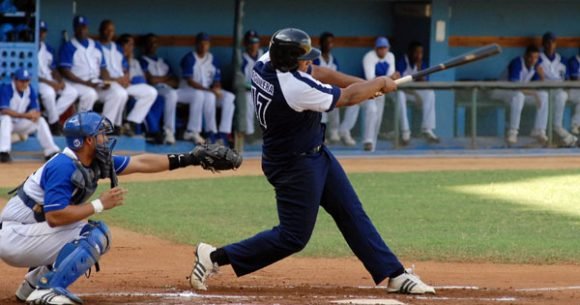
Lerys Aguilera
As of last February 16, it was admitted, through a circular of the Provincial Baseball Commission, the insertion in the 43rd edition of the Holguinera Provincial Series of the baseball players Lerys Aguilera and Yusmel Velázquez, who returned to Cuba before the historic agreement between the U.S. Major Leagues and the ball of the Island.
Those who are trying to sabotage the December 19 pact are deaf to stories like those of these boys, victims of human trafficking, but officially returned to the national sport, as evidenced by the fact that they represent their respective municipalities and are invited to the Holguin Stars Game, to be held on Dec. 31 at the Feliú Leyva Stadium in the City of Parks.
– “It’s inhumane what happens to you.”
An extreme situation is traumatic for any human being. That’s when the fibers of what’s made have to come out. This was experienced by Lerys Aguilera, when he decided to leave his country in April 2014 and try on another baseball. Before he emigrated, he was a consolidated figure in our National Series.
Born in Levisa (1985), Mayarí, province of Holguín, “El Búfalo”, at the time of his departure, had played 11 seasons on the Island and had 108 home runs and 434 runs-batted-in. Generally, he occupied the fourth wood of the holguinero representative.
– You declared that you did not advise anyone to take that path…
“Really, I said it and I reaffirm it, because it is something inhuman that happens to you, you become a bait, a commodity. You risk your life, in the end you go through moments you can’t even imagine. In good Cuban, they are siren songs, they promise you and say a lot, but not even 80 percent of that is fulfilled. Unfortunately, I had to live that experience. It’s a good thing I’m still here, to be able to tell it.
– You also talked about your journey in the illegal boat trip.
“I wouldn’t do it again at all. I was in danger twice. I have no idea where we’re going. I almost drowned, even knowing how to swim, but I was in a situation in which, due to ignorance, the clothes, the backpack and other things I carried weighed heavily on me. If I don’t grab the boat well, I fall and nobody would wait for me, as the night was a wolf’s mouth. It’s unspeakable.
– What are the conditions of the Cuban baseball players who do not win contracts and live in the Dominican Republic?
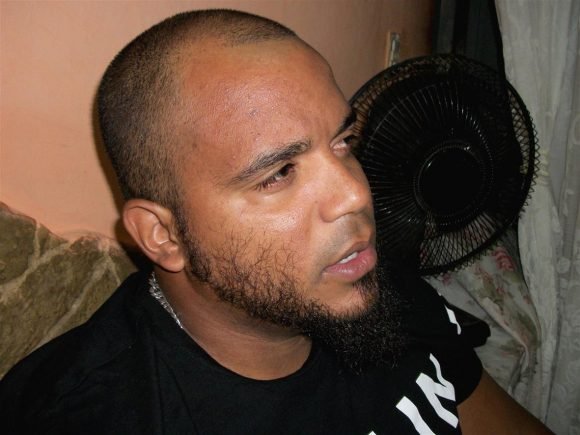
Lerys Aguilera
“It’s an odyssey what they live, we communicate continuously and it’s hard to be like this. When you can’t reach opportunities to play in the U.S. or elsewhere, everything becomes a save yourself. You have to do the unspeakable and work in jobs you’ve never done before, to have an economic income that allows you to survive.
“There are many young people who are in the Dominican Republic ‘eating a cable’, in good Cuban I tell you, having a tremendous job. Without support, without hope. I was able to receive help from many people, even before I left for Nicaragua, but not everyone is so lucky. It has been and continues to be difficult for the Cuban baseball players there.
– Many of them illegal?
“Yes, it’s the safest thing. What happens, most of them do their migratory procedures, stay, in Haiti. But once they cross into the Dominican Republic they become illegal. They are from here to there or they are deported. I managed to get my Dominican identity card, which I first saw as a way of being legal, but then it allowed me to be hired. On October 11, 2017, after coming into contact with the Boer Indians, I left for Nicaragua.
– Do you think that other baseball players can be seen with no apparent way out, like you?
“Of course, it’s desperate. When they cease to have an interest in you, everything becomes more complex. The issue of age can also marginalize you. I spend a lot of time thinking about everything I’ve been through. I had depressions and even tried to attack my life. I suffered from extreme hunger in the Dominican Republic and other very hard moments. I had to train on my own. Thanks to the Lord, those kinds of situations didn’t go to the extreme in me and I didn’t carry out my thoughts.
“What is being done now with legal hiring is a magnificent thing. The baseball players can return to their country without any problem. That’s the way I recommend. Ignore the propositions. The opportunities Cuba opens are the right ones.
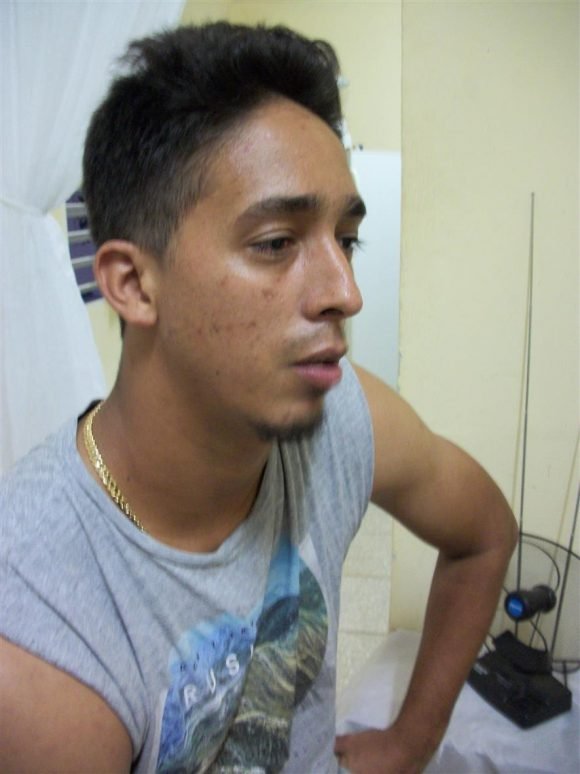
Yusmel Velázquez
– Another Puppy in “return plan”
2015 was a record year in terms of departures of players from the country, legal or illegal. Some, such as colleague Francys Romero, put the number at 150. Among the baseball players who left Cuba was right-handed pitcher Yusmel Velázquez, from Holguín, who had played six National Series, with 34 wins and 35 failures, but at the time was already considered the puppies’ best pitcher.
Velázquez, 27, after entering Haiti three years ago on a risky sea crossing from Maisí (Guantánamo) and staying in the Dominican Republic, returned to his province.
“He had been thinking about returning for months,” he said at home in the City of Parks. The native of the municipality of Urbano Noris is on the island since last November 4, after arriving in the company of his wife and son. But that is present. The future can play a good trick on him.
– Why did you decide to emigrate, just when you were already the pítcher leader of the holguinero staff and perhaps you could have integrated some team Cuba?
“At that moment, I went out in search of better economic conditions. Knowing that I had had good previous years, such as when I made the pre-selection for the Central American and Caribbean Games Veracruz-2014 and, personally, I thought I deserved to be on the team, but I was left out.
“Then, we were told that those of us who had been eliminated were going to the Rotterdam Tournament and then I didn’t make the trip either, without any explanation. Everyone who plays ball in Cuba aspires to become a national team and represent the country. I was a little disappointed that, on so many occasions, I had been pushed aside.
There are still some who think that signing with a U.S. franchise is just a formality. How was your particular case in the Dominican Republic?
“It’s not easy, it’s too big a change. You get to a different baseball, you face difficult training, very different from what you did in Cuba. Sometimes you have to spend several months getting in the right shape, so the Major League teams can see your skills. In the case of pitchers, they have to shoot over 90 mph. I saw very few Cubans who managed to sign.
“There’s still a lot of work going on there, because it’s hard to get hired. I came to be in the form required by the franchises, but for reasons beyond my control, for people who decided for me, I couldn’t be signed. They were three years lost, although at the same time I do not deny that I gained in experience and learning, and perhaps, with the knowledge acquired, I will be able to be a better pitcher in Cuban baseball and help my teammates.
– The “Dominican dream”…
“To the boys who go that way, I say it’s complicated. That it’s an area where you can’t believe in everyone. They, who capture us, promise many things that, in the end, when you are there, are not fulfilled. There’s a lot of ambition for money and you depend on others.
“I was never foreign to the Holguín team, I always followed it on the Internet, I was watching it all the time. Since I returned to Cuba, I didn’t miss a game at the Calixto García Stadium.
Women in the Ring

Boxing: Women in the Ring
Although boxing is inherent to our sporting tradition, several voices linked to Cuban pugilism advocate the inclusion of our women in this sport, a decision that falls to the authorities of this discipline on the island.
By Luis Autié Cantón digital@juventudrebelde.cu
A CubaNews translation.
Edited by Walter Lippmann.
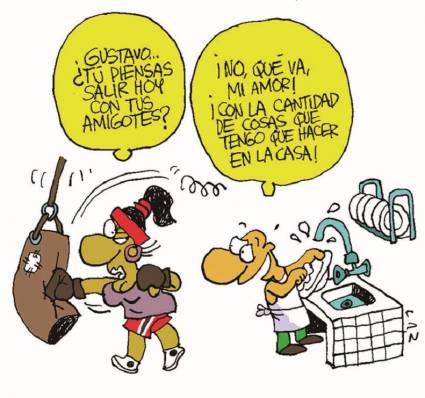
SHE: Gustavo… You’re thinking of going out today with your cronies? HE: I can’t go, my love, with all the things I’ve go to do at home!
Cuba is lagging behind. And no, I’m not talking about transportation or technology. I’m talking about boxing. Our men’s squad are championss because of their respect for each other. To name the four letters in a pugilistic event is to sow, among rivals, fear of the coming storm. It is to know that they will have to die on the canvas to defeat ours. We’ve earned that right over the years. But, I insist, we are lagging behind. When the next edition of the World Series begins, if it sees the light after the corruption scandals at the highest levels of the International Amateur Boxing Association (AIBA), it will be competing in eight male divisions and, listen well, in four female divisions. While this is not yet confirmed, when the river sounds…
And our female boxing, dear reader, doesn’t even bring stones.
Tamers
Nelsy Torres is 21 years old and gets up early every day to train. Her greatest aspiration is to be able to compete officially.
“As a boxer, I need boxing to be legalized because I want to fulfill a dream. If they don’t give me the opportunity, they are slowing down women’s rights. While other countries advance with results, Cuba is lagging behind. I’m sure we can have the same results as men. Even better. We can’t wait for generations of boxers to go by, and we can’t get anywhere,” she says impotently.
Rolando Acebal, helmsman of our main boxing squad, confesses that he has not seen any girl fight here in Cuba, but he does not hide his opinion that we could have good exponents in the future. “Currently, in the world, the countries that practice male boxing also practice female boxing, and no harm has been seen to the health of the athletes. If it had been any other way, it would have been detected and it would all be over.
“There are Cuban coaches abroad who work with women’s boxing. I think we should not deny that right to women who have the desire and have requested the opportunity to train and compete. There are even mothers advocating for their daughters’ opportunity. We’ve been told that they’re analyzing, doing medical studies, but we’ve been doing it for a few years now and we’re lagging behind in that sense.
The Story: A Ring on the Stand
The girls with their jabs, their uppercuts and their hooks are not rain that just fell. Since the 18th century, there have been sports fights between women in this discipline. The Londoner Elizabeth Wilkinson, in 1722, is the oldest known champion. A little more than a century later, it was fought for the first time on this side of the Atlantic, when the bell rang for the North Americans Nell Saunders and Rose Harland to face each other, ring by ring, in 1876, on American soil.
In 1954, almost 80 years later, a women’s poster could be seen on television. One of the fighters who appeared in the “magic box” was Barbara Buttrick, one of the most famous boxers of all time.
The United States was the country where women’s boxing developed the most, following that fight of the nineteenth century. Between 1975 and 1978 some women applied for boxing licenses. Particularly important was the successful trial that the boxers Cathy “Cat” Davis, Jackie Tonawanda and Marian “Lady Tyger” Trimiar carried out against the state of New York, due to the rejection of their requests for licenses. The wide media coverage of these events directed public attention to this discipline.
However, the persistence of restrictions and prejudices led Lady Tyger to go on a one-month hunger strike for women’s rights in boxing in 1987.
As can be seen, some of the most important fights in the history of women’s pugilism have not been fought on canvas, but in the courts. Five years after that hunger strike, in 1992, Massachusetts boxer Gail Grandchamp knocked the system out by getting the state Supreme Court to recognize her right to box after eight years of trial. At the time, the Court held that it was illegal for an official to deny a license to box on the sole ground of the applicant’s sex. However, Grandchamp was unable to practice boxing because he had already exceeded the maximum age of 36 for amateur boxers.
In 1993, the USA Boxing Association, which is responsible for amateur boxing in the United States, agreed to regulate women’s boxing throughout the country after 16-year-old Dallas Malloy won a federal discrimination lawsuit in court.
Despite all the official and unofficial history, of all that baggage that goes back to the eighteenth century, it was not until March 15, 1996, that occurs the fact that is considered by many as the birth of modern female professional boxing. We refer, in this case, to the fight between Christy Martin and Deirdre Gogarty. That same year, the UK Amateur Boxing Association repealed the 1880 ban on boxing for women, and a year later, in July 1997, the first U.S. women’s boxing championship was held. In the following years, other countries were authorizing and organizing this discipline, in the women’s section, and were consecrated world champions in all categories. That is why it is difficult to understand that, in a country like ours, where neither race nor gender distinctions are established, we still do not have the legal or institutional instruments that allow our girls to get into a ring and defend the four-letter t-shirt with their gloves.
Boxing was first included in the modern Olympic program in 1904 in St. Louis, but it wasn’t until London 2012 that women were able to fight under the five hoops.
At the British event, women competed in three weight categories and a total of 36 boxers took part. The Executive Committee of the International Olympic Committee (IOC) still refused to include women’s pugilism as a demonstration sport in the program of the Games four years earlier in Beijing.
The time for women’s boxing matches in summer events is four rounds, two minutes each, unlike men, who fight in three three-minute moments.
If we consider our route, in which boxing has undoubtedly been the sport with the most Olympic and world titles in our history, nothing takes away the right to think that we could, with a little time, become a power of female pugilism. I sign it, and I stamp it.
Cuba, noqueada?
Perhaps one of the aspects that most restrains the Cuban Boxing Federation is the issue of the safety of girls in the ring. In this regard, Rafael Lerena Naples, head of the medical corps of the national team of this sport, believes that there is nothing to worry about in this particular case.
“Unfortunately, we don’t have an athlete in the squad at the moment. The problem is that the competent authorities have not yet authorized Cuban women’s boxing to begin. We are waiting for that”.
The doctor says that “there has never been any damage to the health of these girls”. In this regard, he explains that “the risk in sport is in all specialties. People are at risk of being injured, even walking down the street. However, the risks in high performance are always minimized. The Cuban athlete has entered satisfactorily in all the sports disciplines and for having, especially in the specialties of combat. So why not in boxing? Cuba has demonstrated, with results, quality in boxing since the triumph of the Revolution, and has made it clear that we are a source, a quarry, of good boxers. Why not have boxers”?
“Bebo” Alcántara, 76 years old, ex-bodeguero and boxing fan since childhood, does not understand why women should fight in a ring. “Boxing is a gentleman’s sport. My father always told me this when my mother protested against the violence of the fights. Now, I love boxing, but I don’t see any attraction in seeing two women “punching each other”. Women are more delicate. I think they would lose even femininity.
On the other hand, the soul of the ring, the protagonists, who live daily the intrigulis of this sport, have favorable opinions on the development of them in the pugilism. The light welter Andy Cruz, considered the most complete boxer in Cuba at the moment, expressed his support: “I like very much that they also take into account female boxing. I have seen Cuban women fight, many have come from other sports. I have liked them, I have seen that they have quality and I know that in the future they can achieve great things. I am sure that in a short time they will reach the same height that male boxing has achieved.
Rolando Acebal explains that in Cuba women have had results in sports such as judo, weights or wrestling. “Traditionally, the Cuban woman is brave, a fighter, sacrificed. They are the example of Mariana Grajales, and have demonstrated over the years that they are capable of performing any task.
Hopefully, these voices will serve as a straight line to the chin to change mentalities. Hopefully, the brake and the lack of decision will not recover to the protection count of logic. We want to hear our National Anthem while, on a ring, the referee raises his arm to a Cuban girl.
Approve women’s boxing? – Letters to the web edition
Indalecia Herrera
Sunday 14 April 2019 | 01:03:50 am.
No female boxing.
Alexander
Sunday 14 April 2019 | 09:06:52 am
I am a passionate lover of boxing, in all its dimensions. I do not think it is right to truncate the wishes of any woman, who voluntarily loves this sport and wants to practice it. They want to see history more beautiful than Mary Kom’s. For me the best boxer of all time, within the amateur world. The one that fought against all adversity and prejudices and became multiple Olympic champion. Cuba is left behind, many times for banal justifications. the personal decision of the individuals to respect themselves, as long as it does not affect the general society. And approving female boxing, does not affect anyone. Let’s step forward and in a few years we will have our champions, I’m sure of that. The potential is.
Dany
Sunday 14 April 2019 | 10:07:54 am
Very much in agreement with this inclusion of women’s boxing we are missing medals and opportunities and above all we have not given women their opportunity to demonstrate their boxing qualities that I have no doubt that in a short time they resemble male pairs
Julio Tejera
Sunday 14 April 2019 | 01:42:06 pm
Yesterday I saw a photo on Facebook where in the foreground you can see a woman with a machine gun and in the background a man with an apron in front of the sink and a text almost the same as the caricature .. What a strange coincidence.
Ramon
Sunday 14 April 2019 | 04:37:18 pm.
No to Boxing for women ??? And when they have taken the rifle? If we are going to talk about danger.
José
Sunday 14 April 2019 | 08:47:04 pm
Not allowing female boxing is simply discrimination against women. Only they must decide if they are boxers or not. Why do some people believe they have the right to decide what only they should do? For a long time the female weightlifting was stopped.
Charles
Monday 15 April 2019 | 08:51:53 am.
That other countries do something is not an argument for us to imitate them. But undoubtedly women have the right to practice any sport according to their physical characteristics. I personally do not like boxing and least of all feminine.
Joel Iglesias
Monday 15 April 2019 | 07:47:19 pm.
Well if they want to promote women’s boxing or drawing serves, very badly, each person independent of gender has the same rights, at least is what they enact.
Reinaldo Cedeño
Tuesday 16 April 2019 | 01:25:20 am.
it’s horaaa !!!
Nandy
Tuesday 16 April 2019 | 04:16:15 pm.
If it is found that there is no risk for women, that is, that does not cause any disorder to women because of the blows they may receive in the breasts, etc., I agree that it should be practiced; That the FMC of his opinion on the matter, because I am convinced that they will investigate before giving an opinion.
New IAAF action provokes protest

New IAAF action provokes protest
The IAAF noted that as of the 1st. Athletes participating in events ranging from 400 meters to 1 mile in November may not exceed five nanomoles per liter of testosterone in their blood, the DPA agency reports.
Author: Sports Editor | deportes@granma.cu
27 April 2018 00:04:02
A CubaNews translation.
Edited by Walter Lippmann.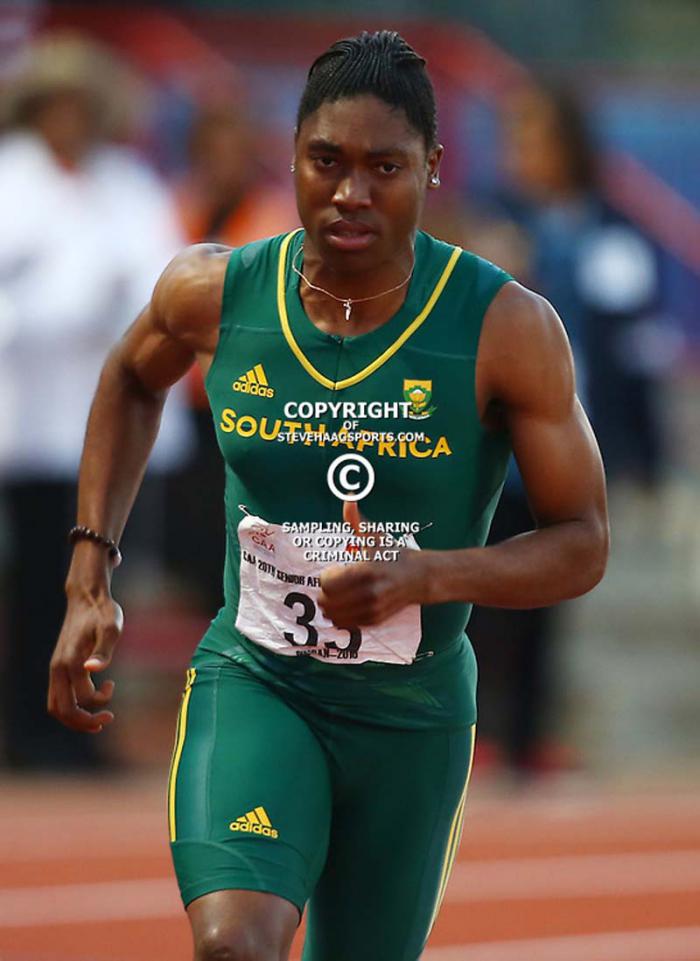
Caster Semenya, the double Olympic title holder in the 800 metres. Photo: stevehaag.photoshelter.com
MONACO – The International Association of Athletics Federations (IAAF) has set a new limit for the participation of women with high testosterone levels in its competitions.
The IAAF noted that as of the 1st. Athletes participating in events ranging from 400 meters to a mile in November may not exceed five nanomoles per liter of testosterone in their blood, the DPA agency reports.
Until now, the tolerance threshold for testosterone levels was 10 nanomoles per litre and will now be halved because, according to studies referred to by the IAAF, a higher proportion “increases muscle mass by 4.4%, strength by 12-26% and haemoglobin by 7.8%”.
Athletes who have a higher natural level should use hormonal contraceptives for six months to stay within the authorized limits.
“The new rules seek to level the playing field to ensure fair competition in athletics, where success is determined by talent, dedication and hard work and not by other factors,” said IAAF President Sebastian Coe of Britain.
ANGRY REACTION
Against the backdrop of the announced decision, South Africa turned out to support its runner Caster Semenya, two-time Olympic champion in the 800 meters, and the South African government said the new regulation would force women athletes with high natural testosterone production to reduce it is a “witch hunt” against them, according to EFE.
“This unfortunate and intentional decision is, at best, a witch hunt against our athlete Caster Semenya,” said South African Sports Minister Tokozile Xasa.
The Minister expressed “disappointment” and “disgust” with the IAAF measure. Xasa wondered if the decision is not a way to try to diminish the dominance of African athletes in the medals and called on South Africans to express their opposition to these new rules “designed to disadvantage” their athletes, the Spanish news agency concludes.
=======================
TRANSLATOR’S NOTE:
DPA is the German Deutsche Presse-Agentur GmbH.news agency.
EFE is a Spanish news agency.
Colin Kaepernick Named Man of the Year

Colin Kaepernick Named Man of the Year by GQ magazine.
November 13, 2017
Translated and edited by Walter Lippmann for CubaNews.
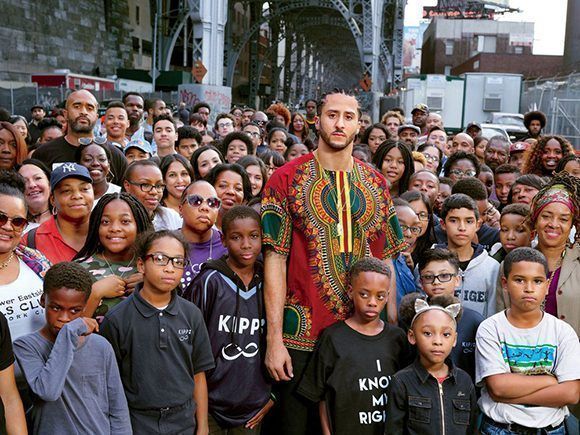
His fight for the rights of African Americans has cost him his career in the NFL, but Colin Kaepernick remains a symbol for activists. Photo: @ GQMagazine / Twiiter.
For a long time, Colin Kaepernick became a true symbol in the United States against the racial violence that the policemen inflict on black people, and that has led to murders.
The American football player’s stand cost him his career in the NFL, since he remains without a team and he himself denounces the fact that he is being made the victim of a “conspiracy” by the competition.
In spite of this, the icon does not abandon his struggle, and has obtained the recognition of being named “man of the year” by GQ magazine.
Kaepernick turned into an icon.
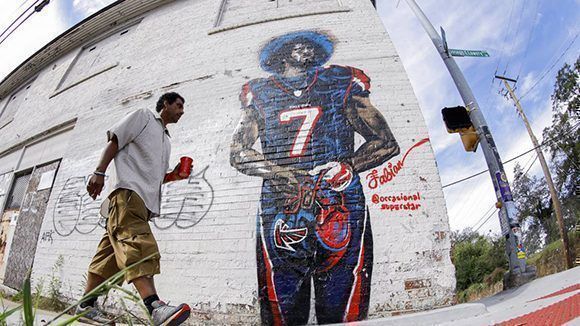
Kaepernick is a symbol in the United States. Photo: EFE
Kaepernick, turned into an icon
Attacked directly by Donald Trump, and seconded by almost all of his NFL teammates who popularized the gesture of kneeling while the US national anthem was played, Kaepernick is already almost a martyr of the racial struggle.
The ex-Quarterback of the San Francisco 49ers will express with words his fight in a book. And presumably that, his word, is the most valuable and complicated thing to obtain from him.
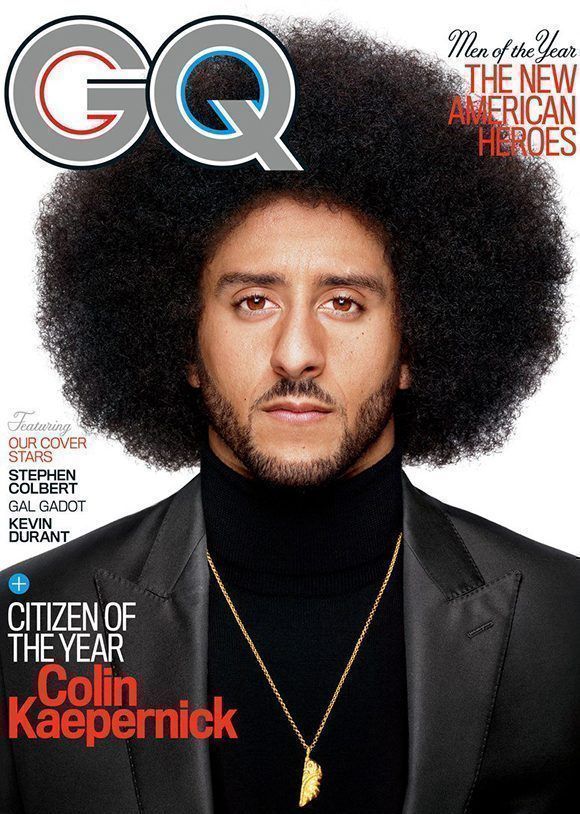
Colin Kaepernick, cover and “man of the year” according to GQ magazine. Photo: GQ.
Good proof is that he has even preferred not to give an interview to GQ for that report in which he is named “man of the year”, although at least he has had the deference of posing in various photos through the streets of Harlem, in New York.
The magazine announced that Kaepernick will be featured on its cover and will be honored as “man of the year”, highlighting his social and racial struggle and his already legendary gesture of August 27, 2016, when he refused to listen standing to the United States national anthem.
Indiscipline Penalty for Industriales Manager

National Baseball Directorate reports on penalty for Industriales manager
October 31, 2017
Translated and edited by Walter Lippmann.
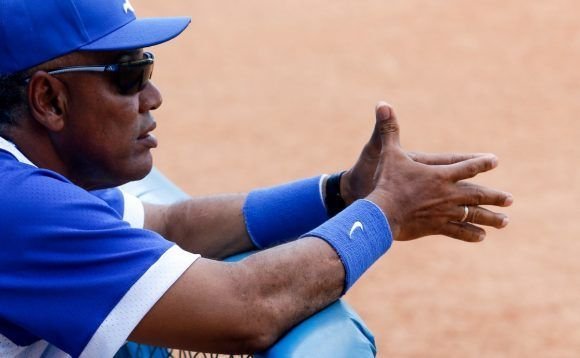
The National Baseball Directorate (DNB) informs our fans that the penalty applied to the manager of the Industriales, Víctor Mesa Martínez, was due to an act of indiscipline committed at the Bella Habana hotel, belonging to the Islazul chain.
The incident, which involved Mesa Martinez and one of the security managers of the installation, occurred last Thursday night, after concluding the first game of the sub-series that the Industriales played against Pinar del Río at the Latin American stadium.
Authorities from the capital, INDER, the Ministry of Tourism and the Islazul chain analyzed in detail what happened, and once the facts were clarified, the DNB proceeded to apply the corresponding measure, in line with the level of seriousness of what had happened.
The evaluation of what happened advised suspension of the manager for a sub-series, which corresponds to the one that those from the capital dispute in front of Granma in Bayamo.
This confirms the principle that discipline is inviolable in all venues of our National Series, and that the weight of the established regulation will fall on those who violate it.
The DNB also wants to explain that, as a rule, it does not provide the details of the events for which its athletes, coaches, affiliates and managers are given penalties, in order to protect the moral integrity of those involved and not to affect the internal dynamics of a team or work collective.
National Baseball Directorate
Cuban President mourns passing of Muhammad Ali
- English
- Español
Cuban President mourns passing of Muhammad Ali
A Google/CubaNews translation.
Edited by Walter Lippmann.

Havana, June 4 (Prensa Latina) Cuban President Raul Castro, today mourned the death of legendary American boxer Muhammad Ali, declaring the Seventh Summit of the Association of Caribbean States (ACS) closed.
We send our message of condolences and solidarity to the family of the great Muhammad Ali boxing champion, the people of the United States, especially the African American community, whose rights he always defended as well as the whole sports community, he said.
In his closing speech, he also said that “we will never forget his chivalry and ethics, his rejection of war and the defense of peace, respect and friendship with Fidel (Castro) and Teofilo Stevenson, the great boxer born in Cuba and Caribbean.”
Considered the greatest boxer of all time, Ali, who was born in 1942 with the name of Cassius Clay until he converted to Islam, died Friday at the age of 74 in a hospital in Phoenix (Arizona) following respiratory complications from his long battle with Parkinson’s disease.
Throughout his brilliant career, in addition to winning Olympic gold medal in Rome in 1960 and establishing himself as world heavyweight champion professional, Ali was about to face in the “Fight of the Century” three-time holder under the five rings and who would be his friend, the Cuban [Teófilo] Stevenson.
Upon learning of his death, personalities from diverse fields, from all corners of the world, sent out similar messages evoking the greatness inside and outside the ring to the boxer who “floated like a butterfly and stung like a bee”, as he described himself.
The ACS Summit met for three days in Havana with the participation of heads of state and government, foreign ministers and representatives of thirty members and associate members of the regional organization to discuss issues of common interest.
Presidente cubano lamenta el fallecimiento de Muhammad Ali

La Habana, 4 jun (PL) El presidente cubano, Raúl Castro, lamentó hoy la muerte del mítico boxeador estadounidense Muhammad Ali, al declarar clausurada la VII Cumbre de la Asociación de Estados del Caribe (AEC).
Enviamos nuestro mensaje de condolencias y solidaridad a la familia del gran campeón de boxeo Muhammad Ali, al pueblo de los Estados Unidos, en especial a la comunidad afroamericana, cuyos derechos siempre defendió, así como a toda la comunidad deportiva, expresó.
En su discurso de cierre afirmó, además, que “nunca olvidaremos su caballerosidad y ética, su rechazo a la guerra y su defensa de la paz, su respeto y amistad con el compañero Fidel (Castro) y con ese gran boxeador nacido en Cuba y caribeño que fue Teófilo Stevenson”.
Considerado el boxeador más grande de todos los tiempos, Ali, que nació en 1942 con el nombre de Cassius Clay hasta que se convirtió al Islam, murió el viernes a la edad de 74 años en un hospital de Phoenix (Arizona) a raíz de las complicaciones respiratorias provocadas por su larga batalla contra el mal de Parkinson.
A lo largo de su brillante carrera, además de conquistar el oro olímpico en Roma-1960 y erigirse campeón mundial de los pesos máximos en el profesionalismo, Ali estuvo a punto de enfrentar en la llamada “Pelea del Siglo” al tres veces titular bajo los cinco aros y quien sería su gran amigo, el cubano Stevenson.
Al conocerse su deceso, personalidades de los ámbitos más diversos emitieron desde todos los rincones del mundo mensajes similares evocando la grandeza dentro y fuera de los cuadriláteros del boxeador que “flotaba como una mariposa y picaba como una abeja”, como él mismo se describía.
La Cumbre de la AEC sesionó por tres días en La Habana con la participación de jefes de Estado y Gobierno, cancilleres y representantes de la treintena de países miembros y asociados de la organización regional para debatir temas de interés común.
Espanol Here
Eduardo Galeano on Muhammad Ali (1967)
- English
- Español

Eduardo Galeano on Muhammad Ali
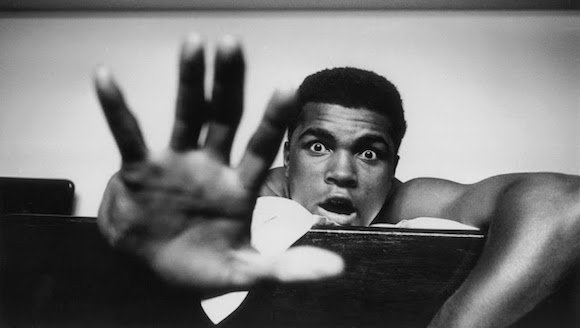
1967: Houston
By Eduardo Galeano
They called him Cassius Clay. He chooses to call himself Muhammad Ali
They made him a Christian. He chooses to make himself a Muslim.
They made him defend himself. No one punches like Ali, so fierce and fast, light tank, bulldozing feather, indestructible possessor of the world crown.
They told him that a good boxer confines his fighting to the ring. He says the real ring is something else, where a triumphant black fights for defeated blacks, for those who eat leftovers in the kitchen.
They advised discretion. From then on he yells.
They tapped his phone. From then on he yells on the phone, too
They put a uniform on him to send him to Vietnam. He pulls it off and yells that he isn’t going, because he has nothing against the Vietnamese, who have don no harm to him or to any other black American
They took away his world title, they stopped him from boxing, they sentenced him to jail and a fine. he yells his thanks for these compliments to his human dignity.
Translation from MEMORY OF FIRE: CENTURY OF THE WIND, by Eduardo Galeano (1988)
 EDUARDO GALEANO is a Uruguayan writer and journalist.
EDUARDO GALEANO is a Uruguayan writer and journalist.
He is the author of THE OPEN VEINS OF LATIN AMERICA.

Eduardo Galeano sobre Muhammad Alí
Lo llamaron Cassius Clay: se llama Muhammad Alí, por nombre elegido.
Lo hicieron cristiano: se hace musulmán, por elegida fe.
Lo obligaron a defenderse: pega como nadie, feroz y veloz, tanque liviano, demoledora pluma, indestructible dueño de la corona mundial.
Le dijeron que un buen boxeador deja la bronca en el ring: él dice que el verdadero ring es el otro, donde un negro triunfante pelea por los negros vencidos, por los que comen sobras en la cocina.
Le aconsejaron discreción: desde entonces grita. Le intervinieron el teléfono: desde entonces grita también por teléfono.
Le pusieron uniforme para enviarlo a la guerra de Vietnam: se saca el uniforme y grita que no va, porque no tiene nada contra los vietnamitas, que nada malo le han hecho a él ni a ningún otro negro norteamericano.
Le quitaron el título mundial, le prohibieron boxear, lo condenaron a cárcel y multa: gritando agradece estos elogios a su dignidad humana.
(En Memoria del Fuego III: El Siglo del Viento)

Subscribe to Blog via Email
| M | T | W | T | F | S | S |
|---|---|---|---|---|---|---|
| 1 | 2 | 3 | 4 | 5 | 6 | 7 |
| 8 | 9 | 10 | 11 | 12 | 13 | 14 |
| 15 | 16 | 17 | 18 | 19 | 20 | 21 |
| 22 | 23 | 24 | 25 | 26 | 27 | 28 |
| 29 | 30 | 31 | ||||

You must be logged in to post a comment.